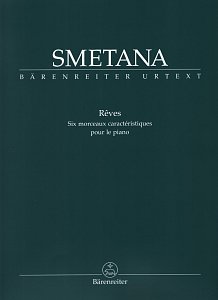Smetana: Réves / Dreams (urtext) / piano - six characteristic pieces
| Publisher | Barenreiter |
| Genre: | classical & sacret |
| Arrangement: | piano |
| Cast: | solo |
| Difficulty: | Advanced |
| Format: | book |
| Series: |
Barenreiter Urtext
Czech composer |
Parameters
| Product code: | BA9529 |
| Composer: | Smetana, Bedřich |
| No. of songs: | 6 |
| Pages: | 48 |
| Language: |
English
German Czech |
| Size: | 24 x 31 cm |
| ISMN: | 9790260104785 |
| Weight: | 270 g |
Songlist (6)
- Zaniklé štěstí / Faded Happiness
- Útěcha / Consolation
- V Čechách. Vesnický výjev / in Bohemia: A Rural Scene
- V saloně / In the Salon
- Před hradem / By the Castle
- Slavnost českých sedláků / Harvest
Product description
In 1875, with six characteristic pieces called Réves (Dreams), Bedřich Smetana returned to his closest instrument - the piano - after more than ten years. The pieces reflect two defining compositional types: the characteristic piano composition and the large-scale virtuoso composition. The creation of the cycle was prompted by a charity concert given in the spring of 1875 by former students of Smetana for the benefit of the deaf composer; Smetana expressed his gratitude by dedications attached to each piece.
This new urtext edition was prepared by musicologist Jarmila Gabrielová on the basis of the first printed edition of Emilián Starý from 1879.
Bedřich Smetana (1824 - 1884) was a Czech composer of the Romantic period. He is one of the most famous Czech composers. From his early youth he was devoted to music, especially piano playing and composition. During his lifetime he worked as a concert pianist, music teacher, conductor and music critic. Smetana wrote mainly operatic and symphonic works. His piano works, concentrated in the early stages of his compositional activity, also occupy a considerable volume in his oeuvre. His chamber music is represented by rare, though substantial, works, and his choruses and songs occupy a rather marginal position. At the age of fifty he became completely deaf, but even after his hearing loss he was able to compose a number of masterpieces. Throughout his work he strove to create a distinctive Czech musical style.









